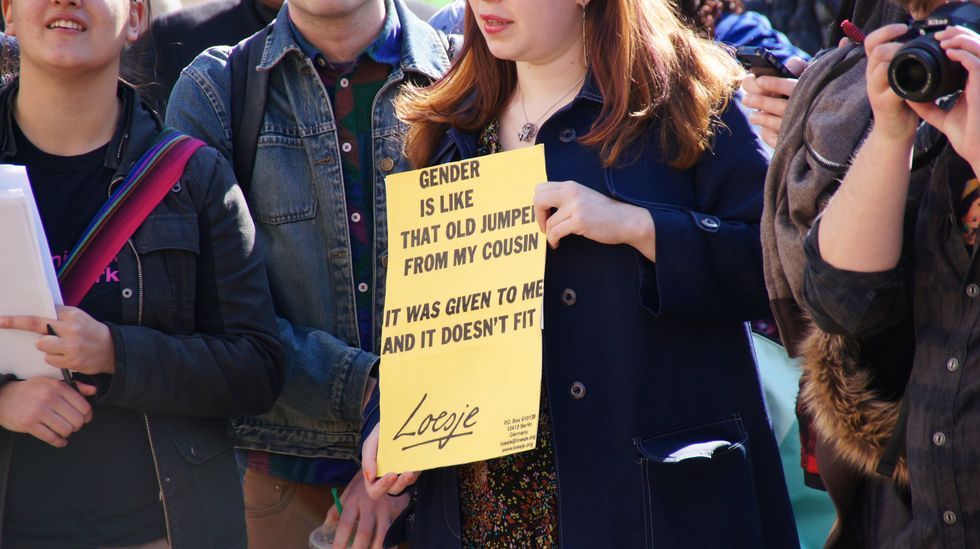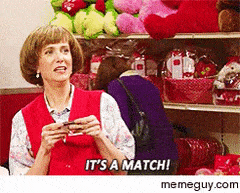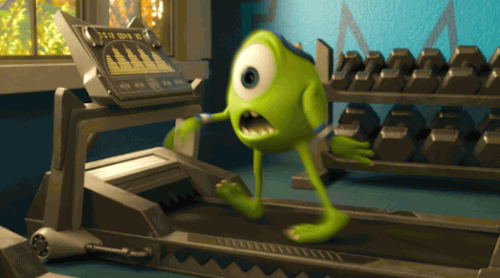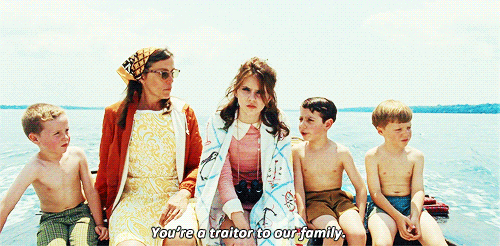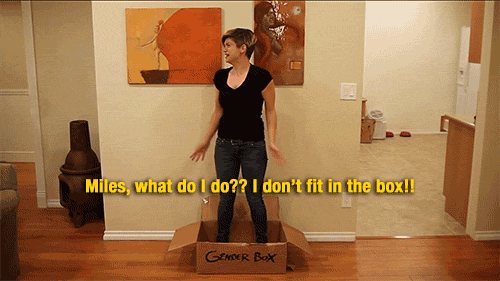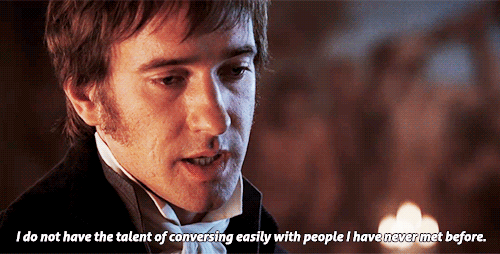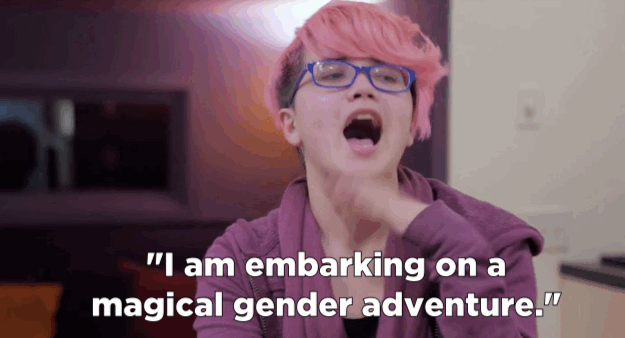It’s not difficult to see how it can be difficult to be transgender in this society. But existing outside the gender binary – well, that’s it’s own special sort of complicated, in a way that a lot of people don’t think about. I’ve talked a little before about being a nonbinary student; I’m 23, queer, and I identify as nongendered; that is, where most people might check “Male” or “Female” on their forms, a box better suited to my identity would read “Not Applicable.” I am not a man or a woman, but rather exist outside the constraints of binary gender. And while visibility for nonbinary and genderqueer folk such as myself increases each day, it’s still complex to actually be the person in such a role. The following are some examples of life processes that are constantly confounded by existing as nonbinary.
1. Social Networking & Dating Sites/Apps
Say I want to make new local friends, or connect with potential matches. I might want to log onto a website or mobile application, browse profiles, or create my own so people can find me. That’s all well and good, except that most aforementioned sites and web services sort and match their users based on gender. You might be asked to identify yourself and who you are seeking as “Man” or “Woman.” Now I haven’t even gotten further than the sign-up page, and I’m already blocked out. So much for meeting new people…
2. Surveys and Forms
Similarly, answering just about any type of form or application results in the same conundrum. Sometimes I’ll fill out a whole survey before it gets to the demographic section, where the little asterisk by the “Gender” or “Sex” box indicates that I am not able to proceed without selecting one. I’ve sometimes had to add my own box to paper forms, leave it off entirely, or just close out. I could click one randomly and continue, but then that begs the question: if someone is gathering data, is the lie then going to lead to misrepresented conclusions? Sometimes you’ve just got to wish people left the “Gender” box fill-in-the-blank instead of Please Select One.
3. Athletics & Fitness
Don’t get me wrong; I’m not really one for exercising, which is how I’ve managed to avoid this issue most of my adult life. But sometimes I make an effort to try working on fitness, only to realize that even if I got up off the couch and went to the gym, I’d be left… without a locker room. Hell, even binary trans people who use the locker rooms appropriate to their gender receive huge public backlash. Similarly, if I ever wanted to join a recreational or competitive team, I’d be hard pressed to find a league that didn’t divide by sex/gender. I guess that’s more couch potato time for me?
4. Pronouns
Oh god, pronouns. Some nonbinary folk who are more femme- or masc-aligned may be inclined to use traditional gender pronouns; that is, “he/him/his” or “she/her/hers.” But for myself and a lot of other genderqueer individuals, those just aren’t correct, which leaves gender-neutral pronouns, along with their accompanying controversy. People can harp on about the singular “they” all they want, but they’ll have to go toe to toe with Jane Austen (and me) about it. And that doesn’t even begin to address the revulsion with which many folks react to invented pronouns, like ze/hir or xe/xem. Introducing yourself to new people when you use nontraditional pronouns tends to result a lot of clumsy adjustment, misgendering, and downright confusion.
5. Family relations
A couple things get weird with your family once you’re out as nonbinary. Like mine, they might have trouble adjusting to your personal pronouns, or even just ignore them. But also, it begs a brand-new terminology in a lot of cases. Instead of being my parents’ son or daughter, I’m now their “child” or “youngest.” Instead of a sister or brother, I’m a sibling; and when my siblings have children of their own, I won’t be an aunt or an uncle, so I’ll be a… what? I tend to go with “auncle.” There’s no consensus yet, but really, a lot of familial terminology is gendered and lacks a single neutral.
6. Titles
To expand on the difficulty of language and gender neutrality, just about any title at all is hard to replicate in gender neutral form. I’m not a Mr, a Ms, a Mrs, or a Miss; not a Sir or Madam, neither witch nor wizard. Many people do use Mx. as an alternative for the first set, but it’s not something included on most forms, nor recognized by mainstream society yet. Of course, you generally don’t use formal titles with friends and family, but in a professional setting it gets tricky, especially for me, because I tend to gravitate towards jobs that involve teaching. Should I ask these 10-year-olds to call me Professor?
7. Using Public Restrooms
I briefly touched upon this when I mentioned gyms and locker rooms, but public restrooms are a whole fiasco for all gender variant folk. It’s hard enough to use a public bathroom that matches your gender identity but not necessarily your appearance; it can be equally perplexing when there literally is no bathroom around that coordinates with your gender. Unisex and gender-inclusive restrooms are a lifesaver, but they are by no means the norm. And unless you want to misgender yourself in public, you might just have to hold it. The only alternative is to awkwardly ask the cashier if you can use the employee restroom instead.
8. Sexuality and Orientation
It’s not just dating sites that aren’t designed for people outside of the male-female gender continuum. Sometimes, being nonbinary is confusing for real-life people’s sexuality and orientation too. Now, theoretically, a genderqueer person isn’t excluded from a person whose attraction is straight (attracted to other genders) or bi/pan (attracted to the same and other genders, or all genders) or whatever it may be. But say someone is straight or lesbian and identifies as only attracted to girls, but likes you anyway? I’m not a girl, so does that change that person’s orientation or self-understanding? Someone else’s orientation is certainly not my domain, but you’d be surprised how often I’ve been asked if someone “has” to “change their identity.” As far as I’m concerned, if you’re attracted to me, your attraction therefore includes people who are neither men nor women. If that makes everyone who likes me a little bit gay, well, I’m okay with that.
9. Talking to Strangers, Ever
Talking to strangers is perhaps the bane of my existence as a nonbinary person. Sometimes this might be in a restaurant, where servers are trained and compelled to address all guests as “ladies” or “gentlemen” or “sir/ma’am”, and I’m left to sit and cringe as I’m misgendered or lumped in with whatever my group looks most like. Other times, it’s just peers on campus or other random citizens I interact with. Gender is so embedded in our society that it rarely takes long for someone to comment on the apparent gender makeup of a group, or call you by pronouns that aren’t yours, et cetera. Let me tell you, it’s awkward to inevitably have to clarify to everyone you meet that you’re nonbinary, especially when just acknowledging the existence of nonbinary genders these days is practically a radical political statement.
10. Transition Itself
Not everyone who identifies outside of the gender binary qualifies themself as transgender, but having such an identity does fall under the trans umbrella. For me, I do consider myself trans, and like a lot of trans people, I seek aspects of social, legal, and medical transition that will help shape my place in society to match what I feel is my most accurate self. But what does this even look like? In a world that is so strictly binary, it’s hard to even imagine what a nongendered person “ought” to be. For instance, if I were to alter my body or take hormones to transition, what exactly would I be transitioning to? What is the nonbinary body? I can change my name to a nongendered name, but most states don’t recognize a third legal gender. It’s hard to pursue a transition into a role which suits you, when there is no existing place for that role in society.
In the face of all this, one might ask: why on earth would someone choose to be nonbinary – that is, to place themselves in an identity that the world doesn’t even acknowledge to exist? But in reality, that’s the wrong question. The real question should be, why doesn’t the world have a place for me, when without a doubt I am here, and nonbinary, and exist?
I think a lot of people when they first learn of my gender identity probably have trouble framing it for a lot of the reasons above. You might wonder: How does that work? Well, it doesn’t really; it’s awkward, and hard to maneuver, and complicated. But the fact remains that I am how I am, and like life, it’s complex and not easy to understand. I and others like me can only hope that the rest of the world catches up to reality; perhaps we can look forward to a future where being ourselves is a little less complicated.

